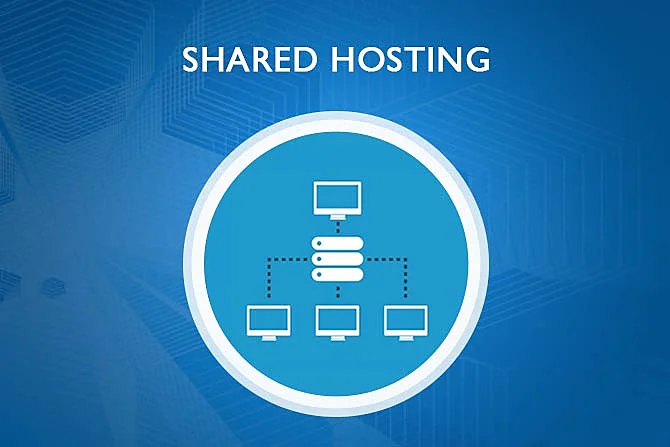Web Hosting Comparison: Shared vs VPS vs dedicated web hosting, you’ve probably heard of these terms, but what do they mean? Is it good for beginners or freelancers? How does it stack up against each other? In this guide, I’ll cover everything about shared hosting, VPS, and dedicated hosting. You’ll learn how it works, its popularity, its limits, and which is the best for your project. But before that lets first understand what the term Webhosting mean.
Web Hosting

Is a service that allows you to store your website’s files, images, content, and data(CMF) on a unique computer called a server so that people worldwide can access your website on the internet. Now, how does it work behind the scenes? Well, your web hosting provider stores your website on a powerful computer called a server, which stays connected to the internet 24/7. This way, anyone who wants to visit your site can do so anytime. Without a web host, your site wouldn’t show up online at all.
Bottom line: Web hosting is the foundation of your online presence. It affects how fast your website loads, how secure it is, and how well it handles traffic. The interesting thing is that there are different types of web hosting, shared vs VPS vs dedicated web hosting, and we will discuss each.
Shared Hosting

Shared hosting means many websites share the same server. This includes resources like RAM, storage, bandwidth, and CPU.
Imagine renting a room in a shared apartment. You have your own space, but you share the server’s resources with others.
How it works:
One server hosts hundreds (sometimes thousands) of websites.
Each website has its own space but shares the server’s infrastructure.
The hosting provider takes care of server maintenance, security, and updates.
Brief History
Shared hosting became popular in the mid-1990s. This was when the internet grew fast with small businesses and personal sites.
The first shared hosting provider was GeoCities, which started in 1994. It offered free hosting for personal web pages. This made web hosting affordable and accessible to many.
Later, Bluehost (founded in 2003) and HostGator (founded in 2002) made shared hosting popular for businesses.
Examples of Shared Hosting Providers
Here are some well-known shared hosting providers and what they are best for.
| Hosting Provider | Best For |
| #2. Bluehost | WordPress integration, beginner-friendly |
| #3. HostGator | Affordable plans, cPanel access |
| #4. Namecheap | Free domain & email with hosting |
| #5. SiteGround | Speed & security, especially for WordPress |
| #6. IONOS | Scalable hosting, free SSL, low intro prices |
For the best deals, reviews, and Web Hosting comparison, check out WebHostInsider.com
Advantages of Shared Hosting
Shared hosting is great for beginners. For beginners, shared hosting removes all the tech stress, letting you focus on what matters, building your website.
#1. Affordability: Plans start as low as $1 to $3/month, making it perfect for beginners, students, and small business owners.
#2. Beginner-Friendly: Most shared hosting packages come with 1-click WordPress installation, free website builders, and cPanel or easy dashboards.
#3. Managed Maintenance: You don’t need to worry about server management, security patches, or software updates—the hosting provider handles it all.
#4. Scalability: You can easily upgrade your plan if your website starts growing.
#5. Free Perks: Most shared hosts offer free SSL, free email accounts, and even a free domain.
Drawbacks of Shared Hosting
Shared hosting isn’t perfect. Here are some of the limitations you should know:
#1. Performance Issues: If a website on the same server gets a traffic spike, your website might slow down.
#2. Limited Resources: You have limited RAM, CPU, and bandwidth. Ideal for low to medium-traffic, not high-traffic sites.
3. Security Risks: Since you share a server, if one website is compromised, others may be at risk (though most hosts have good isolation protocols now).
4. Less Control: Advanced users might find shared hosting restrictive compared to VPS or dedicated hosting.
What Makes Shared Hosting Stand Out?
Low Cost: It’s the cheapest way to get your website online.
All-in-One Packages: Many providers bundle in email, domains, SSL, and support.
Easy Setup: No need to be a tech wizard. Just click and go.
Real Examples of Websites Hosted on Shared Hosting
You might be surprised to know that many small to mid-sized websites—including popular blogs, online portfolios, and local business websites—run on shared hosting.
Here are some types of real-world examples:
#1. Personal blogs hosted on Bluehost
#2. Freelancer portfolios hosted on Namecheap
#3. E-commerce starter stores using SiteGround
#4. Local business websites (restaurants, salons, etc.)
If you’re a beginner, freelancer, or small business owner looking to create your first website, shared hosting is the best place to start. It’s affordable, simple to use, and gives you everything you need to get online.
However, once your traffic grows, or if you’re launching a resource-heavy application, you’ll want to consider upgrading to VPS or dedicated hosting.
Ready to Launch Your Website?
Don’t overthink it. Start with shared hosting and upgrade as your needs grow.
Visit WebHostInsider.com to explore the best shared hosting deals, reviews, and Web Hosting comparison for beginners.
VPS Hosting

If your website has outgrown shared hosting or you’re just trying to understand what hosting fits your needs best, you’ve probably heard the term VPS Hosting floating around. But what exactly is it? And how does it compare to shared or dedicated hosting?
VPS stands for Virtual Private Server. It’s a type of web hosting where a single physical server is divided into multiple virtual servers, and each one functions like a mini dedicated server.
Unlike shared hosting, where you’re sharing resources with hundreds of websites, with VPS, you get dedicated resources (RAM, CPU, storage) within your isolated environment.
Think of it as living in an apartment building where you have your locked unit, not just a shared room.
Brief History.
The concept of virtualization began taking shape in the early 2000s when hosting providers started using hypervisor technology to partition servers.
One of the first commercial VPS services was offered by Virtuozzo (now Parallels), around 2001, pioneering virtual private server tech.
Later, companies like Linode (founded in 2003) and DigitalOcean (founded in 2011) made VPS hosting affordable and developer-friendly.
Examples of Popular VPS Hosting Providers
| Hosting Provider | Best For |
| DigitalOcean | Developers, apps, fast provisioning |
| Linode | Affordable, highly customizable VPS |
| Vultr | Great for global reach and speed |
| Namecheap VPS | Easy upgrade path from shared |
| Bluehost VPS | Beginner-friendly with cPanel |
| Hostinger VPS | Budget-friendly and powerful |
Want handpicked reviews and Web Hosting comparison deals? Visit WebHostInsider.com
Advantages of VPS Hosting (Over Shared & Others)
#1. More Power & Control: You get guaranteed CPU, RAM, and disk space. This means your site loads faster and performs better, even when lots of people visit.
#2. Improved Security: Since your VPS is separate from others, you’re less likely to get malware or problems from other sites. This is unlike shared hosting.
#3. Root Access: Need to install custom software or configure your server? VPS gives you full control. It’s like having your mini server.
#4. Scalability: Most VPS plans are flexible. You can scale up your resources as your site grows.
#5. Affordability Compared to Dedicated: You get many of the benefits of a dedicated server without the huge price tag.
Drawbacks of VPS Hosting
No hosting is perfect. Here’s where VPS has a few downsides:
#1. Requires More Technical Knowledge: Unlike shared hosting, a VPS might need some server management skills. This is especially true if it’s unmanaged.
#2. More Expensive Than Shared Hosting: VPS plans typically start from $5–$30/month. While still reasonable, they’re pricier than the $1–$3 shared plans.
#3. Server Management Can Be a Hassle: Unless you choose a managed VPS plan, you may have to handle things like server updates, backups, and configurations yourself.
What Makes VPS Hosting Stand Out
You get full control of your environment without paying for an entire server.
It’s perfect for growing websites, apps, online stores, and digital agencies.
Many hosts offer managed VPS plans, so even non-techies can enjoy the power without worrying about server stuff.
It’s the sweet spot between affordability and power.
VPS Hosting Limitations to Watch For
Requires a bit more responsibility: You might need to manage your server or hire someone to.
Still not as powerful as dedicated hosting for high-performance sites.
Managed VPS plans can cost significantly more.
Real Websites Using VPS Hosting
Many mid-sized businesses, agencies, and app startups use VPS hosting. Examples include:
Freelancers hosting portfolio websites
Small e-commerce stores (built with WordPress/WooCommerce or Shopify clones)
Agencies running client sites with optimized performance
Developers deploying web apps (Node.js, Laravel, React, etc.)
Tech blogs and niche media sites with 100k+ monthly visitors
Popular websites start on VPS hosting before scaling to dedicated or cloud hosting as they grow.
If you’re a freelancer, small business owner, or serious blogger who needs more speed, reliability, and flexibility.VPS hosting is your next big step.
It gives you the power of a private server without the crazy costs of dedicated hosting. With managed VPS options, even beginners can level up without stress.
Dedicated Hosting

Dedicated Hosting means you get an entire physical server to yourself. No sharing, no virtual partitions—just pure, raw power dedicated to running your website or application.
It’s like having your own private house compared to living in an apartment (shared hosting) or renting a condo (VPS).
If your website or business has outgrown shared or VPS hosting, or you’re simply researching the best hosting option for high-performance needs, Dedicated Hosting might be exactly what you’re looking for.
Dedicated Hosting is used by:
Large e-commerce stores
Enterprise websites
Agencies with multiple high-traffic clients
Apps requiring heavy backend processing
Companies that demand top-tier speed, uptime, and security
Brief history
The concept of Dedicated Hosting emerged in the late 1990s, around the time websites started demanding more performance than shared servers could handle. These pioneers helped set the stage for modern-day enterprise-grade hosting.
Rackspace (founded in 1998) was one of the first companies to offer commercial dedicated hosting services.
Other early players include Liquid Web, ServerBeach, and SoftLayer (now part of IBM Cloud).
Top Examples of Dedicated Hosting Providers
| Hosting Provider | Best For |
|---|---|
| Liquid Web | Fully managed, high-performance hosting |
| Bluehost Dedicated | Beginner-friendly with cPanel |
| HostGator | Budget dedicated hosting with good support |
| InMotion Hosting | Custom configurations, great for agencies |
| IONOS (by 1&1) | Affordable bare-metal servers |
| OVHcloud | Tech-focused, Europe-based |
| A2 Hosting | Turbo servers, developer tools |
Want the best deals and unbiased reviews?
Visit WebHostInsider.com for exclusive web hosting comparisons!
Advantages of Dedicated Hosting (Over Shared, VPS)
#1. Ultimate Performance: Your server is all yours. This means you can get the fastest speeds. It’s perfect for sites with lots of visitors.
#2. Unmatched Security: Since only your site is on the server, it’s safer. It’s great for sites that handle sensitive info or payments.
#3. Full Customization: You can install any OS, apps, or firewalls you want. It’s your server, so you can do what you like.
#4. Handles Heavy Traffic Easily: Dedicated hosting can handle big traffic without problems. It’s great for large apps and busy sites.
#5. Root Access & Server Control: You get full control to make changes or install custom solutions. Or you can hire someone to do it for you.
Drawbacks of Dedicated Hosting:
#1. Higher Cost: It starts at about $70/month and can go up to $500+. It’s a big investment for serious projects.
#2. Technical Complexity: Unless you choose a managed dedicated hosting plan, you’ll need server admin skills. Or you’ll need to hire an expert.
#3. Overkill for Small Sites: If your site has low traffic, you might not use much of the server’s power. That’s a waste of money.
Real-World Use Cases: Who Uses Dedicated Hosting?
Here are some types of websites or companies that benefit from dedicated servers:
Amazon clone e-commerce sites with 10,000+ products
High-traffic news websites and blogs (think 500k+ monthly readers)
SaaS tools and web applications with custom backend needs
Large businesses running multiple client sites or portals
Online game servers (e.g., Minecraft, Rust)
What Makes Dedicated Hosting Stand Out from Other Hosting Types
#1. Full Resource Control: You get 100% of the server’s CPU, RAM, bandwidth, and storage—nothing is shared with others. Unlike VPS or Shared Hosting, your site’s performance is never affected by “neighbors.”
#2. Maximum Security: Since only your websites live on the server, you avoid common security threats that come from shared environments. Ideal for industries that require compliance (HIPAA, PCI-DSS, etc.).
#3. Complete Customization: You can choose your own OS (Linux, Windows), server software, security tools, and control panels. VPS offers some flexibility, but a Dedicated server gives you root access to the entire physical server.
#4. Perfect for High-Traffic or Resource-Intensive Sites: If your site or app receives thousands to millions of monthly visitors, only Dedicated Hosting can handle it with zero lag. It’s the best option for video streaming, e-commerce at scale, databases, or web applications.
#5. Scalability with Add-Ons: While not as instantly scalable as cloud hosting, Dedicated Hosting allows hardware upgrades (RAM, drives, etc.) to boost power without changing platforms.
#6. Ideal for Agencies & Developers: You can host multiple clients’ websites with custom configurations and dedicated IP addresses. Some providers let you partition your server like a VPS farm, creating isolated environments for each project.
#7. Managed or Unmanaged Options: Choose unmanaged hosting if you’re a sysadmin or dev team, or go for fully managed dedicated hosting if you want someone else to maintain everything for you.
If your site needs maximum performance, full control, and serious security, then Dedicated Hosting is the top choice. It’s perfect for big businesses, sites with lots of visitors, apps, or agencies handling many projects.
But it’s not for everyone. If you’re still growing or don’t need full server access, VPS hosting is a good middle option.
Shared vs. VPS vs. Dedicated vs. Cloud Hosting (Comparison Table)
| Feature | Shared Hosting | VPS Hosting | Dedicated Hosting | Cloud Hosting |
| Cost | $1–$5/month | $5–$40/month | $80–$300+/month | Pay-as-you-go |
| Resources | Shared with others | Private virtual slice | Entire server to yourself | Distributed resources |
| Security | Lowest | Medium | High | High |
| Performance | Basic | Moderate | Excellent | Scalable, fast |
| Skill Needed | None | Moderate | Advanced (unless managed) | Moderate |
| Scalability | Poor | Easy to upgrade | Harder, but powerful | Instantly scalable |
| Best For | Beginners, blogs | Freelancers, SMBs | Large sites, agencies | Growing startups/apps |
Ready to Choose a Hosting Plan?
Don’t guess your way through hosting. Whether it’s Shared vs VPS vs Dedicated. We’ve got you covered. Compare web hosting, compare top providers, read real reviews, and grab the best deals today at WebHostInsider.com

